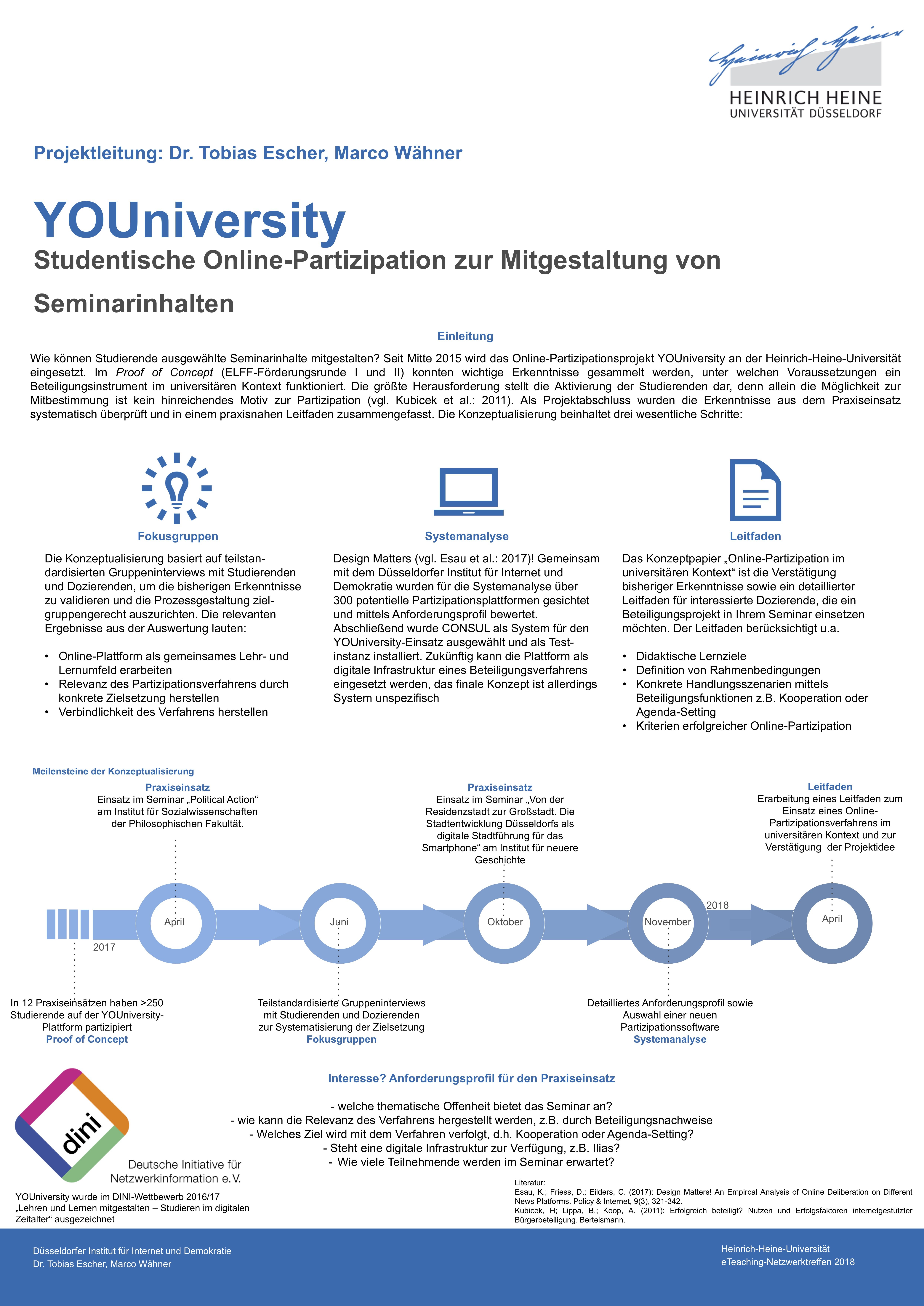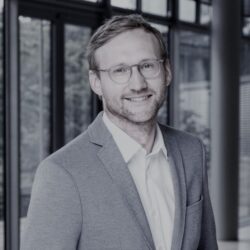YOUniversity is an online participation project that has been running at Heinrich Heine University Düsseldorf since the 2015/16 winter semester. Using an online platform, students can help shape the content of their seminars and propose their own topics. In the past two project rounds, more than 200 students from different faculties have participated in the project, contributing their own ideas to the seminar design and shaping seminars discursively.
At the same time, important insights into the conditions under which students participate on a participation platform were gained during the implementation. On the one hand, YOUniversity can be used by lecturers who would like to try out a digital tool for seminar preparation; on the other hand, the platform can offer students an interaction module to integrate their own wishes and ideas into the seminar plan.
In the winter semester 2022/23, the YOUniversity concept below was fundamentally revised. In addition, some materials were created to make it easier for lecturers to implement YOUniversity in courses. The materials and further information can be found here.
The idea behind YOUniversity
 YOUniversity is an online participation tool that enables students to have a say and help shape seminar content. Using an online platform, students can discuss topics and content, make their own suggestions, or collect ideas together. Thus, the participation project moves in the balancing act between participation and didactic teaching design: YOUniversity can be used on the one hand by lecturers who want to try out a digital tool for seminar preparation, on the other hand, the platform can offer students an interaction module to introduce their own wishes and ideas into the seminar plan. The interaction promotes the exchange between students and lecturers as well as between the students themselves and can be seen as a factor influencing the quality of studies.
YOUniversity is an online participation tool that enables students to have a say and help shape seminar content. Using an online platform, students can discuss topics and content, make their own suggestions, or collect ideas together. Thus, the participation project moves in the balancing act between participation and didactic teaching design: YOUniversity can be used on the one hand by lecturers who want to try out a digital tool for seminar preparation, on the other hand, the platform can offer students an interaction module to introduce their own wishes and ideas into the seminar plan. The interaction promotes the exchange between students and lecturers as well as between the students themselves and can be seen as a factor influencing the quality of studies.
The open source platform Adhocracy is used to collect, comment and vote on suggestions. The didactic sovereignty remains with the lecturers. At the end of the project, the goals will be evaluated by the participating lecturers and students.
Emergence
YOUniversity emerged from the project course of the interdisciplinary teaching module “Theory and Practice of Online Participation”. YOUniversity was then used for the first time in the summer semester of 2016 in three selected seminars of the Faculty of Philosophy at Heinrich Heine University Düsseldorf (HHU). Although the general feasibility of an online participation project could be confirmed in this phase and the goal of qualitative contributions could be achieved, the (voluntary) participation of the students remained below expectations. Finally, during a six-month follow-up grant from the ELFF, measures were field-tested in the winter semester 2016/17 to increase student activity. Building on the findings of the first funding phase, various measures were finally implemented in the selected seminars of the second project round, including in particular the introduction of participation formats.
Participation formats
These participation formats differ between the formulated requirements as well as the effort required from students, and in doing so, they have a relevant impact on the activity as they delineate the possibilities for participation:
- Discussion focus: Instructors provide the guiding topic, related literature, and a general question about the topic. Based on the topic, students can now discuss which aspects they consider important to work on within the seminar. Before the actual seminar session, the key statements, focal points of the discussion as well as the respective points of view are summarized and published online for the students.
- Suggested topics: The lecturers offer the students the opportunity to contribute their own suggestions for the design of a seminar session. For this purpose, specific requirements for a topic suggestion are defined in advance, for example the search for further literature or the formulation of an independent question.
- Collecting and evaluating ideas: The students propose ideas on a topic determined by the lecturers, which are evaluated by the students in a further step. The participants first collect suggestions, can discuss them if necessary and finally evaluate them. The requirements for the ideas are lower than for the topic proposals, but especially suitable for efficiently collecting proposals in order to make a selection for the seminar. The format relies in particular on low-threshold participation, such as the evaluation function.
Basically, all participation formats offer framework conditions under which a participatory process can be organized. The formats can be understood as a toolbox for participatory teaching design, which can not only be combined with each other, but also adapted depending on the seminar requirements. In summary, YOUniversity is a participation tool that, from a synthesis between participatory and didactic approaches, enables students to design seminars in order to increase the quality of their studies.
Use to date
Winter semester 2022/23
- Politics in the Digital Age (Head: Dr. Katharina Gerl)
- Internet and Democracy (Head: Dr. Dennis Frieß)
- Computational Social Science. Theory and Methodology (Head: Marco Wähner)
Summer term 2016
- Internet and Democracy (Head: Dr. Dennis Frieß, Department: B.A. Media and Communication Studies, Institute of Social Sciences).
- Political Participation (Direction: Dr. Katharina Gerl, Department: B.A. Political Science, Institute of Social Sciences)
- Lying in Politics (Direction: Prof. Dr. Stefan Marschall, Department: M.A. Social Sciences, Institute of Social Sciences)
Winter semester 2016/17
- “Voice for your Seminar – Philosophy in Film” (Direction: Valerie Timm)
- Sociology of Health: Systems, Structures, and Interactions (Directed by: Mira Hassan).
- Power, Status, Gender (Direction: Jun.Prof. Dr. Ulf Tranow)
- Functional Programming (Head: Dr. Jens Bendisposto)
Summer term 2017
- Political Action (Director: Dr. Bastian Rottinghaus)
Winter Term 2017/18
- From a residential city to a big city. The urban development of Düsseldorf as a digital city tour for the smartphone (Director: Jan Niko Kirschbaum)
Further development
In the project rounds to date, the general feasibility could be confirmed, but the individual effort required to implement a participation project is still to be rated as high. In the future, YOUniversity will be further developed based on the experience gained so far, so that it can be made available to lecturers across faculties as an instrument for seminar design and student interaction. Since spring 2017, the requirements have been specified in a comprehensive analysis with various stakeholder groups and with the involvement of experts. Subsequently, an application-oriented concept is to be developed so that YOUniversity establishes itself as an innovation in digital university teaching in the medium term.
Funding
- December 2015: iQU-fund of the Heinrich- Heine- University Düsseldorf
- March – August 2016: eLearning support fund of the Heinrich-Heine-University Düsseldorf (5.600€)
- September 2016 – March 2017: eLearning support fund of the Heinrich-Heine-University Düsseldorf (3.100€)
- March 2017 – February 2018: eLearning support fund of the Heinrich-Heine-University Düsseldorf (6.600€)
Contact
If you are interested in further information, please contact Marco Wähner.
Contact
Jun.-Prof. Dr. Tobias Escher
Board, Computer Science, Political Science, Sociology

Tobias Escher leads a BMBF-funded junior research group investigating the effects of participation processes on the quality and legitimacy of political decisions, especially in the context of the transformation to sustainable mobility in the local context. Previously, he supervised the DIID as well as the NRW Forschungskolleg Online-Partizipation at the HHU-Düsseldorf as scientific coordinator. He is a social scientist and holds a PhD from the Oxford Internet Institute at the University of Oxford. He can also draw on his basic knowledge of computer science when assessing the possibilities and limits of digitization.
His research focuses on the evaluation of political participation online and offline. In particular, he addresses the question of the extent to which citizen participation contributes to higher quality and legitimacy/acceptance of political decisions. He has developed a teaching module on the theory and practice of online participation, from which, among other things, a project on student participation in teaching has emerged.
Photographer: ©Tilman Schenk


